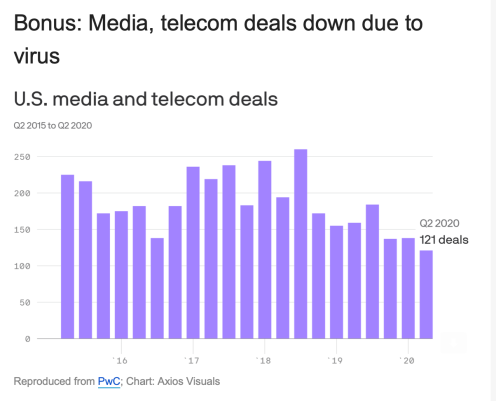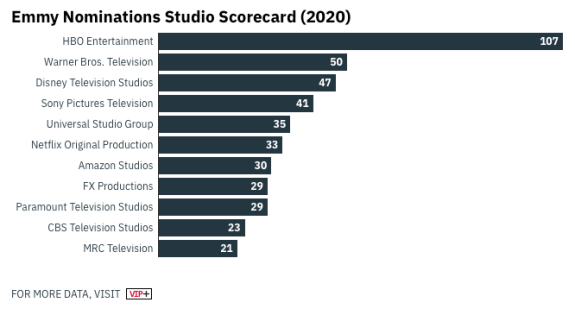Let’s zig while everyone else is zagging, shall we?
Sure, PVOD is officially a thing for one theater chain and one studio. But we knew a compromise was coming eventually. Meanwhile, I’m looking at the power brokers of entertainment for my story of the week.
Most Important Story of the Week – CAA Finally Lays Off Agents
When Covid-19 began it’s spread, everyone was impacted. Lots of companies had to furlough workers, cut hours, start work from home and begin to plan for a pandemic-impacted future.
The challenge is trying to figure out which impacts are temporary, and which could be permanent. (Which I’ve tried to do a few times.)
In film and TV specifically, studios were hit with both supply and demand shocks: they couldn’t release films in theaters and had to stop production. The logical next step was for studios to severely curtailing deal making. Why spend money if you’re not making money?
Unfortunately for Los Angeles–and similar regions around the globe–the Hollywood economy is like an ecosystem in the natural sense of the word. The studios are the plankton that feeds all the animals in the sea from theaters to cable channels to cable distributors to home entertainment video producers to independent PR shops to swaths of entertainment lawyers to unknown hordes of marketing consultancies to…agencies/managers.
I highlight that last group because of all the support groups it’s not clear that they have to exist. They do serve roles in the system and one could (maybe) make the case they even add value. But most industries work just fine without dedicated third parties hoarding/managing talent. (Head hunters exist, but are much less prominent in other industries.)
Moreover, as time has passed and agencies have consolidated, their business model–being blunt–is much more about being gatekeepers who charge rents to reach talent than connecting the right people with the right projects. Gatekeepers then extract rents, which exceed their value and you can tell they’re succeeding because they build lavish offices and have enormous expense accounts. See CAA and WME.
Thus the news this week feels bigger than just “industry being impacted by Coronavirus”. Theaters are being impacted too, but most have reduced costs and will survive until a therapeutic or vaccine is developed. Cable TV made it through. Theme parks are reopening, though limited. Sports will see revenue cut in maybe half, but everyone will cut salaries and continue on.
At first, I would have said the same thing about agencies. The agencies matched other businesses by cutting hours and expense accounts. (Though honestly, who had meals to go to under quarantine?)
Now the agencies are laying off agents. Specifically, CAA is last to the party. “Laying off” is a step more dire than “furlough”. Agents could be furloughed if there is no work to do. Laying them off means, generally, that they can’t come back. While lots of businesses are laying off workers, an agency is literally only its workers! They don’t make or produce anything; without agents, an agency isn’t an agency!
This change is potentially seismic.
If you have fewer people to make deals, it means you anticipate fewer deals to make in the future. One explanation could be that studios will pull back from making new shows. I don’t buy that at all, especially with the boom in streaming services.
Instead, the reality may be that we don’t really need agents, and the pandemic threw that into sharp relief. At least one group of talent proved that it doesn’t really need agents. (Or not agents from the two major firms.) The writers fired all their agents last year and still film and TV development continued. If agents are a vital cog in the machine, what to make of the fact that when that cog was removed for writers…nothing changed?
Let’s not overreact too much. It’s *only* 5% of the workforce that is being laid off and likely none of the top agents. (Furloughs are temporary so I’m less likely to consider that a permanent change.) Every other agency has already let go of their staff. Maybe this was as inevitable as AMC Theaters and Comcast coming to a deal. Or maybe I’m not going far enough: WME is a debt burdened goliath that failed to IPO and doesn’t actually have a strategy for the future.
If I’m a studio or production company, I’d look to a post-agent future. In addition to being gatekeepers, agents in a lot of ways are bad talent spotters. They send the same writers and same directors and same actors to development executives. This makes for so much of the dross that comes to screens. Worse, because they do all the packaging, many development execs have lost the ability to find great talent and great projects. (A role producers used to play more prominently in the system.)
If a studio can re-develop the skill at developing projects–a role the agencies were happy to do for them for a fee–it could pay dividends.
The Next Most Important Story of the Week – Comcast-AMC Theaters Truce
It’s still a big deal! But in a change, I was asked to write my thoughts for Decider. It’s a good one and may change how you look at this big news. (When that article goes up, I’ll provide a link.
Data of the Week – ESPN’s Huge Baseball Ratings
We have our first test of the thesis that Covid-19 changed everything. First up, sports. With everyone stuck at home, and experimenting with TikToks, Fortnites, and Twitches, maybe they’ve moved past live sports?
![]()
My prediction is that when Lebron and the Lakers take on Kawhi and the Clippers last night for the NBA’s return it will set similar ratings. (This article was written before it happened.)
Long term what are the impacts? Well, if sports dominate linear TV, they’ll become even more important to the cable bundle’s survival. Meanwhile, if sports really do grab the attention of 1/3rd to 1/2 of viewers, we could see viewership decline on the streamers, new channels and scripted cable/broadcast proportionally. Sports news websites should see a spike in traffic too. If the streaming wars are really the “attention wars”, then a new battleground of attention is returning.
M&A Updates
There wasn’t a lot of news out of the antitrust hearings on capitol hill, besides headlines speculating this is a “Big Tobacco” moment. My overall takeaway is only one of two things can be true:
- The lead executives for major tech companies are surprisingly uninformed about large parts of their businesses. As such, they should be fired for incompetence and poor leadership. Tank their stocks!
- The executives were lying when they said they “couldn’t recall” many details about their companies.
Obviously, number 2 is true.
Don’t sleep on antitrust as the defining business issue of the 2020s. If breaking up conglomerates of all shapes and sizes becomes a trend, that will have ramifications up and down every value chain. Smart business leaders can strategize around that. But that’s a big “if”.
One of my favorite corners was predicting in 2018 that M&A wouldn’t “explode” following the approval of the AT&T/Time-Warner merger. And indeed it remained mostly flat, and then got walloped by Covid-19. (Which does not count as something I predicted!) Here’s the table from PwC, recreated by Axios:

While PwC provides the best in class data for M&A–I used it extensively back in 2018–their headline is straight boiler plate “this changes everything” unexplored assertion. Yawn.
Other Contenders for Most Important Story
HBO Max Got “4 Million” New Subscribers
On last week’s The Business Kim Masters pointed out that it’s unclear if 4 million additional HBO Max/HBO subscribers is good or bad news for AT&T. She’s totally right: if you don’t set expectations ahead of time, when you do get a data point, you end up fitting it into your pre-existing narrative. That’s bad.
Unfortunately, I didn’t follow this advice myself. I didn’t expect HBO Max to give us subscriber numbers so I didn’t plop down a forecast.
I do have a tentative prediction. For new services with brands like this, I’m beginning to see a curve I’m calling the “substack” curve. I call it that because I first saw it when a substack author showed their subscriber growth. If someone has a preexisting brand, then they sign up lots of people at first. Then it slows down, but often it picks up momentum later on. (My curve has done something similar, though my “brand” was still small at launch.) If you’re familiar with the typical S-curve/bass diffusion curve, this is almost the opposite: start out big, slow down, then accelerate later.
We’ve already seen this with Disney+, which added huge numbers in November–the brand!–and then slowly added folks and has likely seen a pick up with Hamilton, and will see more acquisitions with the big Marvel shows. HBO Max is on a similar path. Four million was the branding launch, and then it will slow down and they hope to add more later when the next Game of Thrones prequel comes out.
In other words, we could read this as the HBO Max to Disney+ is about 40% of the value. My caveat? Most of HBO Max is just HBO, and 30 million folks already have that. Plus, Covid-19 killed any chance at a good, buzzy original series, which Disney+ had.
(The best read I came across this week was this Variety VIP article in front of their pay wall. Also, after I published this Peacock announced it had 10 million sign-ups. I’ll tackle that next week.)
Folks seem to like Hulu’s redesign. Others have said it mirrors Netflix, which begs the question, “Do you like Netflix’s interface?” I think half of customers do and half don’t. Meanwhile, I just long for the streamer with the play list feature that most closely mirrors my current DVR. The DVR is the best UX period.
Tenet’s Latest Plan
Open worldwide end of August, and then Labor Day weekend where possible in the United States. Given this is fairly convoluted, it’s probably the most likely to stick. Also, Disney moved Mulan again, date unknown. It also pushed Star Wars and Avatar, but that has more to do with production being paused than theaters not being open.
Tom Cruise “Space” Movie Plans for a Theatrical Launch
Not the biggest story of the week, but it did cause me to pause. Cruise may just be risk averse for streaming, or maybe he knows he’ll get much bigger paychecks in theaters. I opt for the latter. (With the caveat that my favorite line in any story is “The movie is also said to not yet have a script.”)
Management Advice of the Week – Don’t Bring Your Laptop to Class (or Meeting)
One of the sections I’ve neglected in this newsletter is my management advice for entertainment professionals. Cleaning out links, I stumbled on this gem that still holds up.
Essentially, under experimental conditions, if you’re on a laptop you can’t pay attention as well to a lecture. Multiple studies back this experimental finding up and I’ve read studies extending it to smartphones.
So what can you do about it? Easy: don’t bring electronics to meetings. You’ll retain more information in the meeting and be more engaged. What about our coronavirus zoom world? Well, close every screen beside the open Zoom room and use a pad and paper to take notes/plan.
Lots of News with No News – Emmy 2020 Edition
Every year the Emmys garner tons of news coverage and every year I tell you to ignore this shiny bauble. As nominations per category have generally increased, and studios compete in more and more categories, the odds that a studio sets a record for Emmy nominations increases, which Netflix did this year. However, this Variety chart was the most telling graph I saw:

In other words, Netflix’s skill is buying shows in bulk; HBO’s and other traditional studios is making shows.

